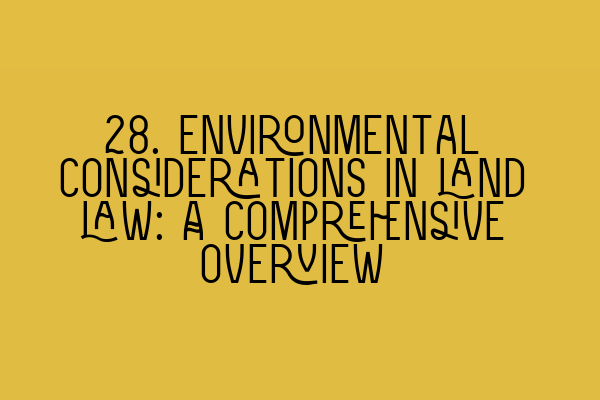Environmental Considerations in Land Law: A Comprehensive Overview
As property solicitors at SQE Property Law & Land Law, we understand the importance of environmental considerations in the realm of land law. With increasing concerns about climate change, pollution, and overall environmental sustainability, it is crucial to explore the intersection between land law and environmental protection. In this comprehensive overview, we will delve into the various environmental considerations that are relevant to land law, including planning permissions, environmental impact assessments, contaminated land, biodiversity protection, and sustainable development.
Planning Permissions and Environmental Impact Assessments
In the context of land law, planning permissions play a significant role in regulating land development and use. Planning permission is typically required for various types of development, such as building construction, changes of land use, and large-scale infrastructure projects. When considering planning applications, local planning authorities must assess the potential environmental impacts of the proposed development.
Environmental Impact Assessments (EIAs) are a vital component of the planning process. EIAs are conducted to evaluate the potential environmental effects of a proposed development on the surrounding area. These assessments analyze various factors, including air and noise pollution, water resources, biodiversity, and cultural heritage. The findings from these assessments are crucial for decision-makers to determine whether the development should be granted planning permission.
It is important for property solicitors and developers to understand the legal requirements surrounding planning permissions and EIAs. By doing so, they can navigate the intricate planning process smoothly and ensure compliance with relevant environmental regulations.
Contaminated Land
Contaminated land refers to land that has been polluted by hazardous substances or contaminants. These contaminants can pose a significant risk to human health and the environment. In the United Kingdom, the legal framework for dealing with contaminated land is primarily governed by the Environmental Protection Act 1990 (Part IIA).
Under Part IIA, local authorities have powers to identify, remediate, and prevent the pollution of contaminated land. Property solicitors are often called upon to advise on the liabilities and responsibilities associated with contaminated land, especially in transactions involving the sale or purchase of potentially contaminated sites.
It is crucial for property solicitors to conduct thorough due diligence to assess the environmental risks associated with contaminated land. This involves conducting environmental searches, obtaining historical information, and engaging with relevant environmental experts. By identifying potential environmental liabilities, property solicitors can provide valuable advice to their clients and facilitate informed decision-making in land transactions.
Biodiversity Protection
Preserving biodiversity is a key environmental consideration in land law. Biodiversity refers to the variety of plant and animal species within a particular ecosystem. Protecting biodiversity is essential for maintaining the balance of ecosystems, promoting resilience against climate change, and preserving the overall health of the environment.
In the United Kingdom, biodiversity protection is primarily governed by legislation such as the Wildlife and Countryside Act 1981 and the Conservation of Habitats and Species Regulations 2017. These laws aim to protect endangered species, habitats, and designated sites of conservation importance.
When dealing with land transactions or development projects, property solicitors play a crucial role in ensuring compliance with biodiversity protection laws. This involves assessing the potential impacts of a development on habitats and species, advising on mitigation measures, and obtaining necessary permits or licenses.
Sustainable Development
Sustainable development is an overarching principle that guides environmental considerations in land law. It involves achieving a balance between economic development, social well-being, and environmental protection. Sustainable development aims to meet the needs of the present generation without compromising the ability of future generations to meet their own needs.
The concept of sustainable development is enshrined in various national and international policies, such as the United Nations’ Sustainable Development Goals and the National Planning Policy Framework in the UK. Property solicitors and developers have a responsibility to promote sustainable development in their practices.
This includes advising clients on incorporating sustainability measures into land development projects, such as energy-efficient design, use of renewable resources, and adherence to green building standards. Property solicitors can also assist clients in navigating government incentives and grants that promote sustainable development.
Conclusion
Environmental considerations are increasingly important in the context of land law. With the growing recognition of the need for environmental protection and sustainability, property solicitors must stay informed about the legal framework and best practices surrounding environmental considerations in land transactions and development. By integrating environmental considerations into their legal advice, property solicitors can contribute to responsible and sustainable land use practices.
If you’re interested in exploring other topics related to property law and land law, check out our related articles:
